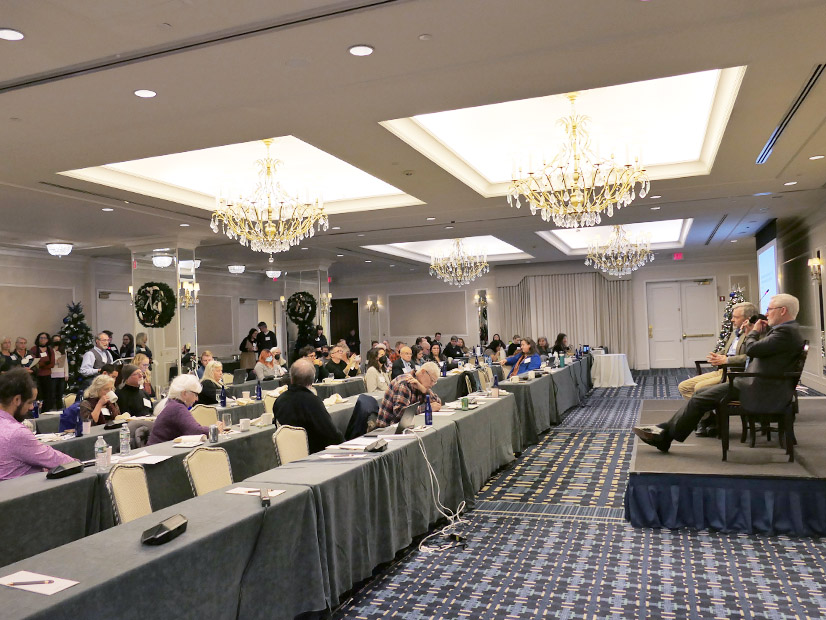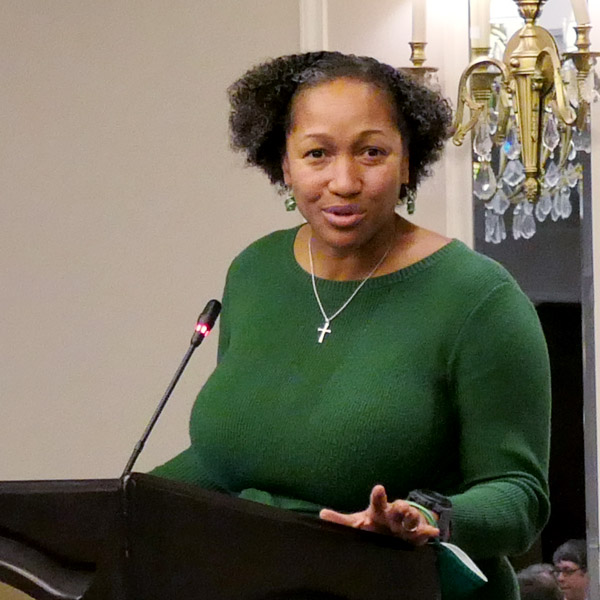
BOSTON — A year removed from the takeover of the ISO-NE Consumer Liaison Group (CLG) Coordinating Committee by a group of climate activists, the CLG’s return to Boston brought an intense focus on the need to rapidly cut emissions while centering the needs of frontline communities. (See Climate Activists Take Over Small Piece of ISO-NE.)
The “Community Welcome,” a new feature of CLG meetings, was provided by the Rev. Mariama White-Hammond, Boston’s chief of environment, energy and open space.
“Let’s be honest: Five years ago, I’m not sure I would have been the person here speaking,” White-Hammond told attendees while starting her address.
White-Hammond highlighted the importance of environmental justice in the planning and siting of new energy infrastructure.
“We have to be honest about the fact that for many years, we have put the most polluting facilities in black and brown communities and in poor and working-class communities,” White-Hammond said. “The question is: How can we build an energy system that repairs those harms while also recognizing that the consensus is clear … that climate change is happening because of our use of fossil fuels.”
Speaking to the climate advocates at the meeting, White-Hammond emphasized that electrification of heating and transportation will require a significant amount of new electricity infrastructure, including substations and transmission lines.
Turning to policymakers and other stakeholders, White-Hammond called for greater imagination in planning and siting to avoid replicating the mistakes and injustices of the past.
When considering the needs for new infrastructure, White-Hammond said energy efficiency and demand reductions should come first, followed by building up infrastructure in areas that have not historically been asked to host energy infrastructure, or are driving the need for the infrastructure. Only as a final resort should major projects be sited in vulnerable communities that already host a disproportionate share of infrastructure, White-Hammond said.
In these cases, the community benefits of hosting the infrastructure must well exceed any detrimental impacts, she added. These local benefits could include increased access to renewable energy, lower electricity costs and improved grid resilience.
Reliability, Affordability and Sustainability
Matt Christiansen, general counsel for FERC, stressed the importance of maintaining grid reliability and affordability, then took a series of public questions that focused largely on FERC’s ability to speed up the retirement of fossil fuels.
Judith Black, a climate activist and member of 350 Mass, pushed back against Christiansen’s framing, arguing sustainability should be included among FERC’s top priorities.
“There’s a scientific consensus that we are at the edge of our extinction, and just saying reliability and affordability is like putting on huge blinders,” Black said. “Sustainability has got to be a third prong of this work.”
Christiansen said while FERC must remain fuel neutral, the commission will play an essential role in ensuring the grid can manage the increasing number of distributed weather-dependent renewables.
“Wind and solar are probably going to be the predominant part of our resource mix before too long,” Christiansen said. “The best thing anyone can do if you’re an advocate of those resources is making sure that the infrastructure and the market rules are in place so that those resources can contribute to a reliable grid that people can afford.”
Climate advocates also pushed representatives of ISO-NE to do more to expedite fossil fuel retirements and emissions reductions, to which representatives of the RTO also stressed their resource neutrality. However, ISO-NE CEO Gordon van Welie said the RTO is open to implementing a carbon pricing mechanism in the RTO’s markets if all six New England states can reach an agreement.
“We’ve talked a lot internally about how we could implement carbon pricing,” van Welie said. “In my view, this is the quickest way to accelerate the clean energy transition.”
Also, van Welie highlighted the role that active demand response could play in reducing emissions associated with the daily peak load but said this “needs to be activated at the retail level” and therefore would be the jurisdiction of the states.
With peak loads on the grid expected to rise dramatically in the coming decades, “we have to really scale up demand response in this region,” van Welie said.
Several audience members echoed the need for accelerated demand response efforts but contended ISO-NE could play a larger role in engaging the public to reduce demand during times of peak load.
“I think I can speak for more than just some of the people in this room when I say we would rather turn everything in our apartments off than see a coal plant get called on for the peak,” said Rebecca Beaulieu of 350 New Hampshire.
In response, Anne George of ISO-NE said the RTO calls for conservation only during last-resort efforts to prevent forced outages, and that sending out frequent conservation requests would dull their effects when they are needed most.


